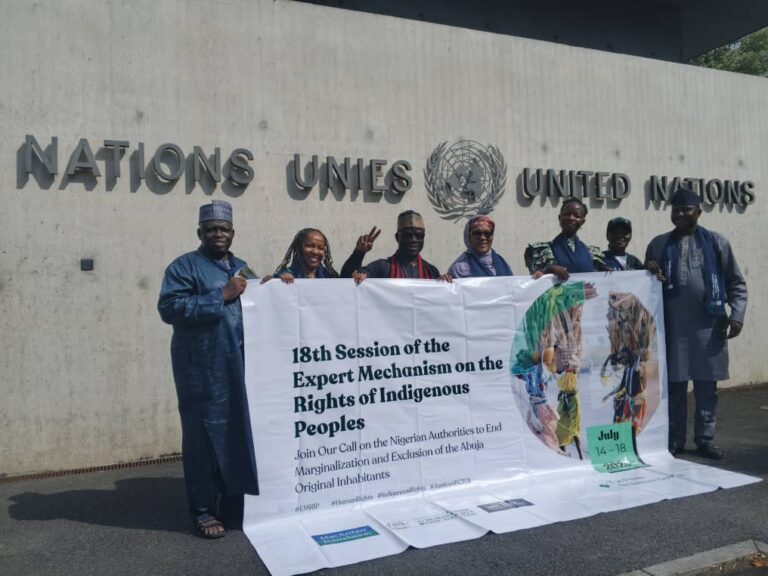The Executive Director of the Resource Centre for Human Rights and Civic Education (CHRICED), Dr. Ibrahim M. Zikirullahi, has echoed the alarm over what he described as the worsening plight of the Indigenous Peoples of Nigeria’s Federal Capital Territory (FCT), Abuja.
Speaking at the ongoing 18th Session of the Expert Mechanism on the Rights of Indigenous Peoples (EMRIP) in Geneva, Switzerland, Dr. Zikirullahi said over two million indigenous peoples, also known as the Original Inhabitants (OIs) of Abuja are face all sort of injustice.
He told the gathering of international experts and stakeholders that the Abuja OIs face a grim reality of “systematic exclusion, land dispossession, political disenfranchisement, and cultural erasure. “These communities are on the brink of extinction. Without urgent and decisive action, their identity and heritage may be lost forever.” He warned.
The Executive Director traced the root of the crisis to Military Decree No. 6 of 1976, which forcibly appropriated the ancestral lands of Abuja’s Original Inhabitants for the creation of Nigeria’s new capital.
Nearly five decades later, he said, the Nigerian government has failed to offer compensation, resettlement, or even legal recognition despite court judgments affirming the rights of these communities.
READ ALSO: CHRICED Demands Justice In Guzape Land Fraud Scandal, Accuses IGP Of Shielding Suspect
“Even Nigeria’s own Supreme Court decisions in favour of the OIs have been ignored,” he lamented. “Not one government has honoured these judgments.”
CHRICED further criticized the Nigerian state for its failure to collect and utilize disaggregated data that reflect the socio-economic realities of indigenous peoples in the FCT.
“Despite the work of global institutions like UNESCO and UNICEF confirming their existence, the Nigerian government continues to erase them from national data sets,” Dr. Zikirullahi said.
He emphasized that data sovereignty—control over data that concerns indigenous peoples—is a crucial pillar for self-determination and sustainable development. “Data is not just a technical matter,” he said. “It is a tool for justice, visibility, and empowerment.”
The impact of neglect, he explained, is felt in every aspect of the lives of the OIs. Basic amenities such as healthcare, education, clean water, and infrastructure are severely lacking.
Traditional livelihoods—like farming, fishing, hunting, and craftsmanship—are endangered by rapid urban expansion and environmental degradation.
Politically, the Original Inhabitants face total disenfranchisement, with no power to elect a governor or local legislature. “They are stateless in their own homeland,” Dr. Zikirullahi remarked.
He called on the UN Expert Mechanism, member states, and development partners to hold the Nigerian government accountable and to support a list of urgent demands.
READ ALSO: CHRICED Partners Abuja Varsity To Establish Heritage Centre For FCT Indigenous Communities
These include the legal recognition of the OIs as Indigenous Peoples; political inclusion in democratic governance; equitable access to land and economic resources; and the preservation of their languages and traditions.
Dr. Zikirullahi also advocated for the right of Abuja’s Original Inhabitants to manage their own data systems, and urged Nigeria to begin collecting inclusive, disaggregated data by tribe, gender, age, and location.
“The survival of Abuja’s Original Inhabitants—and the preservation of their identity, dignity, and heritage—depends on urgent and coordinated intervention,” he concluded. “Development must never come at the cost of dispossession or cultural extinction. Justice delayed is dignity denied.”

